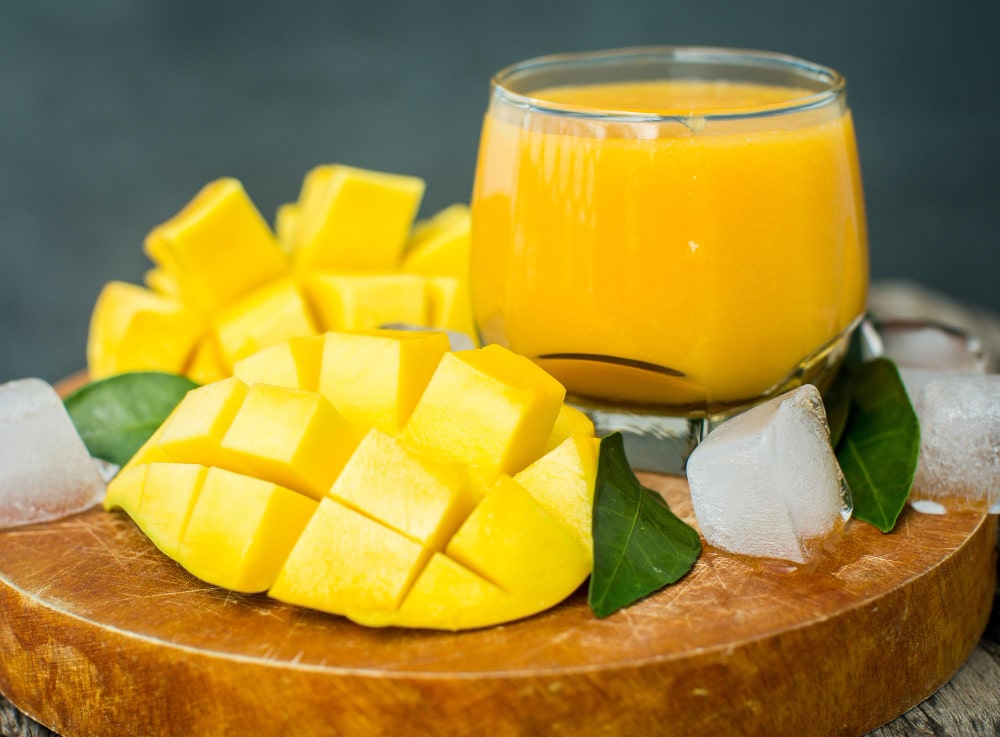Orange mango juice is a delicious, refreshing drink with two of the most flavorful fruits – oranges and mangoes. Packed with vitamins and minerals, this nutritious beverage can be enjoyed as an occasional treat or as part of a healthy diet. This article overviews the nutrition facts, ingredients, equipment and tools, recipes, fruit selection tips, serving and presentation ideas, health considerations, and storage and preservation recommendations.
Benefits of Orange Mango Juice
- Loaded with vitamins A and C, potassium, dietary fiber and antioxidants
- Helps boost the immune system
- It may reduce the risk of certain diseases
- Provides a sweet and tangy flavor to drinks and dishes
- It can be used as a substitute for added sugar in recipes
Nutritional Value
1) Caloric Content
A single serving of orange mango juice contains approximately 120 calories, with no added sugars or artificial sweeteners. This makes it a great choice for those looking to cut down on their sugar intake.
2) Vitamins and Minerals
Orange mango juice contains vitamins and minerals, including Vitamin A, Vitamin C, Potassium, Dietary Fiber, and antioxidants. These nutrients help boost energy levels, improve immune system function, and reduce the risk of certain illnesses and diseases.
Read More: Belly Fat Burning Juice Recipes: Everything You Need To Know
3) Health Benefits
Orange mango juice is full of beneficial vitamins and minerals that can help to improve overall health. Vitamin A helps to promote healthy skin and eyesight, while vitamin C helps to boost the immune system and reduce inflammation. Potassium helps to regulate blood pressure levels, dietary fiber aids in digestion, and antioxidants help fight off cell-damaging free radicals. Drinking orange mango drinks provides various health benefits and can enjoy as part of a healthy diet.
| Nutrient | Amount per Serving |
| Calories | 120 |
| Protein | 2g |
| Fat | 0g |
| Carbohydrates | 28g |
| Vitamin A | 20% |
| Vitamin C | 80% |
| Potassium | 10% |
| Dietary Fiber | 4g |

Ingredients
Fruits
When selecting ingredients for orange mango juice, it is important to choose ripe fruits as these contain more flavor and nutrition. Ripe oranges, mangoes, and lemons should create a balanced flavor.
Sweeteners
Orange mango juice can enjoy without added sweeteners as it has a naturally sweet flavor when the fruits are ripe. However, if desired, a small amount of sugar or honey can be added to balance out the tartness of the juice.
Read More: 5 Best Juice for Constipation: A Comprehensive Guide
Herbs and Spices
If desired, a pinch of herbs and spices can add to orange mango juice to boost its flavor. Fresh ginger, cardamom, and mint are all great options for adding a unique layer of flavor.
Equipment and Tools
1) Blender or Juicer
To make orange mango juice, a blender or juicer is required for blending and juicing the fruits. A high-speed blender is ideal for creating a smooth consistency. However, if an extra boost of nutrition is desired, then a slow juicer can be used instead.
2) Strainer
Once the orange mango juice has been blended or juiced, it should strain through a fine-mesh strainer to remove any pulp and seeds. This will give the juice a smoother texture and reduce its bitterness.
3) Glasses
Finally, glasses are needed for serving the orange mango juice. It is best to use tall glasses so that the color and visual appeal of the juice can enjoy.
Read More: 12 Best Fruits to Juice: Boost Your Health
Orange Mango Juice Recipes
1. Basic Orange Mango Juice
Ingredients:
- 2 ripe oranges, peeled and deseeded
- 1 mango, peeled and pitted
- 1/2 lemon, juiced
- 1 cup of water (optional)
- Sweetener of choice (optional)
- Herbs and spices (optional)
Steps:
- Place the oranges and mango in a blender or juicer.
- Add lemon juice, water (if using), sweetener (if desired), and herbs and spices (optional).
- Blend or juice until the fruits are completely broken down.
- Strain through a fine-mesh strainer to remove any pulp and seeds.
- Pour the juice into glasses and serve immediately.
2. Orange Mango Smoothie
Ingredients:
- 2 ripe oranges, peeled and deseeded
- 1 mango, peeled and pitted
- ½ cup of yogurt
- ½ cup of nut milk or oat milk
- 1 teaspoon honey (optional)
- Herbs and spices (optional)
Steps:
- Place the oranges, mango, yogurt, and nut/oat milk in a blender.
- Add honey (if desired) and herbs and spices (optional).
- Blend until the fruits are completely broken down, and the mixture is smooth.
- Pour the smoothie into glasses and serve immediately.

Read More: Guava Juice Drink: Nutrition Facts, Benefits and More
3. Tropical Twist Mango Juice
Ingredients:
- 2 ripe oranges, peeled and deseeded
- 1 mango, peeled and pitted
- ½ cup of pineapple juice
- ¼ cup of coconut milk or cream
- Sweetener of choice (optional)
- Herbs and spices (optional)
Steps:
- Place the oranges and mango in a blender or juicer.
- Add pineapple juice, coconut milk/cream, sweetener (if desired), and herbs and spices (optional).
- Blend or juice until the fruits are completely broken down.
- Strain through a fine-mesh strainer to remove any pulp and seeds.
- Pour the juice into glasses and serve immediately.
4. Mango-Orange Freeze Pops
Ingredients:
- 2 ripe oranges, peeled and deseeded
- 1 mango, peeled and pitted
- ½ cup of water (optional)
- Sweetener of choice (optional)
- Herbs and spices (optional)
Steps:
- Place the oranges and mango in a blender or juicer.
- Add water (if desired), sweetener (if desired), and herbs and spices (optional).
- Blend until the fruits are completely broken down, and the mixture is smooth.
- Pour the mixture into freeze-pop molds and freeze overnight.
- Serve frozen mango-orange freeze pops for a refreshing treat!
Read More: Pear Juice for Constipation: Nature’s Solution to Digestive Woes
Tips for Selecting Fruits for Your Orange Mango Juice
When selecting fruits for your orange mango juice, it’s important to choose fruit that is ripe and in season. Ripe fruit will be sweeter, juicier, and easier to blend or juice. Additionally, it’s best to purchase organic fruit when possible, as this ensures the least chemicals and pesticides are used. Lastly, try experimenting with different herbs and spices to give your orange mango drink a unique flavor. Ginger, turmeric, or even lemongrass can add an additional dimension of flavor to your juice!
Serving and Presentation Ideas
Orange mango juice can serve cold and is a great way to start the day. For a special occasion, try adding a few fresh slices of orange and mango to the finished drink for an extra pop of color! Alternatively, freeze your orange mango drink in ice cube trays or freeze-pop molds for a refreshing summer treat. No gala event or summer picnic would be complete without them!
No matter how you serve it, orange mango juice is sure to delight. Enjoy!
Storage and Shelf Life Information
It’s best to consume your orange mango juice immediately after blending or juicing for maximum freshness. If you plan on storing your orange mango drink, store it in an airtight container in the refrigerator. Consume within 2-3 days for optimal taste and nutrition. Keep in mind that freezing or canning your orange mango drink will extend its shelf life but may also result in a loss of nutrients. Enjoy!
Read More: Pineapple Orange Juice: Benefits, Recipe, Nutrition Facts
Health Considerations
1) Sugar and Calorie Control
Orange mango juice is a nutritious and refreshing beverage, but it’s important to consider its sugar and calorie content. A cup of homemade orange mango drink contains approximately 110-130 calories and 25-30 grams of sugar. If you’re trying to control your sugar or calorie intake, limit your consumption of orange mango drink.
2) Dietary Restrictions
Orange mango juice is a great beverage choice for those with dietary restrictions such as veganism, gluten sensitivity, or nut allergies. As long as you use all-natural ingredients without added sweeteners, preservatives, or artificial flavors, your orange mango drink will be safe to consume and free of any potential allergens. Enjoy!
3) Allergies and Sensitivities
Orange mango juice can be a great option for allergies or sensitivities. Still, it’s important to note that oranges and mangos may contain sulfites, latex, or pollen allergens. If you have an allergy or sensitivity to these ingredients, avoid drinking orange mango drink or seek medical advice before consuming.
Conclusion
In conclusion, orange mango juice is a delicious and nutritious beverage virtually everyone can enjoy. It’s easy to prepare at home, and when stored properly in the refrigerator, it can maintain its freshness and flavor for up to 3 days. However, it’s important to consider the sugar and calorie content of orange mango drinks if you’re trying to watch your intake. Additionally, if you have any allergies or sensitivities to oranges, mangos, sulfites, latex, or pollen, it is recommended that you avoid drinking orange mango juice. With the right precautions and preparations in place, orange mango drink can be a great addition to anyone’s diet!
Read More: Smoked Chicken Breast Recipe: A Delicious and Healthy Delight
FAQs
Yes, orange mango juice is suitable for children. It’s a great source of vitamins and minerals that can help support their healthy growth and development. However, it’s important to consider the sugar content if you’re trying to limit your child’s intake. You can always dilute the orange mango drink with some water or add an extra squeeze of fresh lemon or lime drink for a lower-sugar alternative. It’s also recommended to check with your child’s doctor before introducing any new foods or beverages to their diet.
It depends on your tastes and dietary needs. Mango juice is slightly higher in sugar and calories than orange juice but contains more vitamins and minerals. Orange juice typically contains more vitamin C, while mango juice has more magnesium, potassium, and beta-carotene. If you’re looking for a healthy alternative to sugary drinks, an orange mango drink is a great choice. It provides essential vitamins and minerals that are found in both fruits. Plus, it has a delicious sweet-tart flavor that’s hard to resist!

